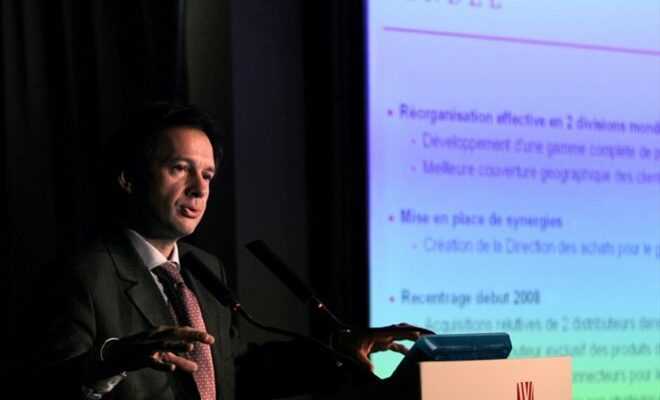Jean-Bernard Lafonta, during a press conference on the results of the Wendel group, on March 27, 2007 in Paris (AFP/Archives/ERIC PIERMONT)
The former chairman of Wendel’s management board, Jean-Bernard Lafonta, challenged Monday at the bar to have “imposed” on his executives in 2007 a financial package, the accusation of which believes that the only purpose was to protect from the tax authorities more than 300 million euros.
Jean-Bernard Lafonta succeeds before the Paris court to eleven executives, former and current, of the investment company, as well as the former boss of the bosses Ernest-Antoine Seillière, then at the head of the supervisory board.
In this bloated case, they must explain their participation in a very sophisticated operation called Solfur, which allowed fourteen leaders to apprehend a total of 315 million euros in capital gains without being taxed immediately.
Arrived in the early 2000s within the former 300-year-old steel group that has become an investment company, Jean-Bernard Lafonta is suspected of having “supervised” Solfur and of having put pressure on executives to join.
Main beneficiary with some 116 million euros, he is tried for tax evasion, but also for complicity in that of his co-defendants.
The man who has since co-founded the HLD fund, 60, dark jacket over a dark turtleneck, answers the bar in an even voice, one of his lawyers regularly slipping documents under the bar.
The president reads one by one the emails seized during the search, in which Wendel officials, including Mr. Lafonta, their renowned tax lawyers and the bank JP Morgan draw the Solfur assembly from October 2006.
A scheme whose “purpose was not fiscal” and which he himself did not grasp, at the beginning, all the “complexity”, assures Mr. Lafonta.
At the end of January, the operation is presented to executives during an annual seminar in the chic resort of Méribel (Alps) – a “presentation of half an hour, an hour” at the “end of the day”, confirms the defendant.
One of the executives recounted during the investigation that he had, that day, opposed “in a loud voice” to the operation and had declared that he wanted to “pay the tax”, before Mr. Lafonta did put an end to this discussion: “this scheme is the best possible”, “there is no other”, reads the president.
“Nothing prevented [ce cadre] to pay the tax in 2008, it is an individual declaration”, sweeps Mr. Lafonta, who claims to have “no memory” of this exchange.
– “Absurd” –
The delicate assembly of profit-sharing involved the creation of companies and, for some, by a significant debt. The goal, for the National Financial Prosecutor’s Office (PNF): to artificially place capital gains under a “suspended taxation” regime, in order to “bypass” the law and to defer, then escape, tax.
Mr. Lafonta did not follow this “generic” pattern, but the prosecution believes that his earnings should have been taxed there too.
Several executives declared during the investigation to have seen their hand forced, continues the president. In notes found at his home, the legal director at the time, Arnaud Desclèves, wrote that he had been “imposed” on the scheme and in particular a clause preventing the dissolution of companies before 2010 – the date of the tax prescription.
Mr. Desclèves was then in “litigation” with Wendel, argues Jean-Bernard Lafonta. “Everything that was written was nonsense”.
After the financial crisis of 2008, Solfur had proved ruinous for many of its participants. Considering himself wronged, Mr. Desclèves had initiated proceedings in the commercial court against Wendel.
Financial prosecutor François-Xavier Dulin insists: another defendant also said he had “no choice”.
For “any person” in his situation, “I think the first temptation is to say everything to defend himself, including + I had no choice +”, replies Mr. Lafonta.
This man was “at the highest level of responsibility in the investment team. You think people were appointed to this level of responsibility if they were not able to understand what they were doing in financial operations ?”, he loose, adding that the executives were “offered an hour of free advice” and “suggested to take their own advice”.
In December 2010, like all the defendants, Jean-Bernard Lafonta was notified of a tax adjustment: 85 million euros with penalties. After paying over several years, a transaction was concluded with the taxman – who reimbursed him 34 million.
Invited to say a last word, he lets go: “Nobody ever imagined for a moment that this subject could have a criminal dimension”.
A former tax lawyer is also on trial for complicity in tax evasion. The requisitions are expected on Tuesday.
© 2022 AFP
Did you like this article ? Share it with your friends with the buttons below.




